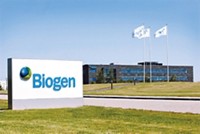Advertisement
Grab your lab coat. Let's get started
Welcome!
Welcome!
Create an account below to get 6 C&EN articles per month, receive newsletters and more - all free.
It seems this is your first time logging in online. Please enter the following information to continue.
As an ACS member you automatically get access to this site. All we need is few more details to create your reading experience.
Not you? Sign in with a different account.
Not you? Sign in with a different account.
ERROR 1
ERROR 1
ERROR 2
ERROR 2
ERROR 2
ERROR 2
ERROR 2
Password and Confirm password must match.
If you have an ACS member number, please enter it here so we can link this account to your membership. (optional)
ERROR 2
ACS values your privacy. By submitting your information, you are gaining access to C&EN and subscribing to our weekly newsletter. We use the information you provide to make your reading experience better, and we will never sell your data to third party members.
Neuroscience
Biogen makes big bet on Sage neuroscience compounds
The small molecules will bolster its weak drug pipeline
by Lisa M. Jarvis
December 2, 2020
| A version of this story appeared in
Volume 98, Issue 47
In a bid to reinvigorate its drug pipeline, Biogen is paying Sage Therapeutics $1.5 billion, comprising $875 million in cash and a $650 million ownership stake, to codevelop two small molecules for neurological conditions.

One, zuranolone, is part of a class of antidepressants called positive allosteric modulators of the γ-aminobutyric acid (GABAA) receptor, which is part of a chemical messaging system that normally calms nerve activity. The compound is in Phase 3 studies to treat major depressive disorder and postpartum depression. The other, SAGE-324, is a positive allosteric modulator of GABAA receptors in Phase 2 studies to treat a common movement disorder called essential tremor. Sage expects to see study results for both drug candidates in 2021.
Biogen says zuranolone will complement its other neuroscience drugs and drug candidates, as depression often accompanies neurological disorders like Alzheimer’s, multiple sclerosis, and Parkinson’s disease.
But the purchase is also meant to help allay concerns over the health of Biogen’s pipeline, which is heavily reliant on the success of the Alzheimer’s treatment aducanumab. The US Food and Drug Administration is currently weighing a new drug application for the antibody, which recently got a thumbs down vote from the agency’s advisory committee. The review panel was sharply critical of the weak evidence of aducanumab’s efficacy. While the agency can go against the recommendation of its advisors, most industry watchers believe the drug won’t be approved.
The disastrous panel added to pressure for Biogen to make a splashy move. Beyond thin near-term prospects for new drugs, the big biotech firm also faces declining revenues for its multiple sclerosis drug portfolio. And its spinal muscular atrophy treatment Spinraza, an oligonucleotide-based therapy, has seen sales fall as gene therapy and small-molecule treatments enter the market.
Although Biogen paid dearly for its share of Sage’s neurology compounds, “with aducanumab’s approval chances little more than a coin toss, a rapidly eroding MS franchise, and Spinraza facing increasing competition, we see moves like these as necessary,” Piper Sandler analyst Christopher J. Raymond writes in a note to investors. “In fact, we think investors should be looking for additional deals like this.”




Join the conversation
Contact the reporter
Submit a Letter to the Editor for publication
Engage with us on Twitter